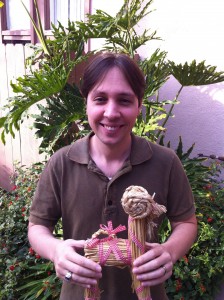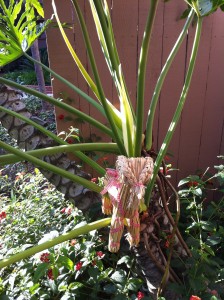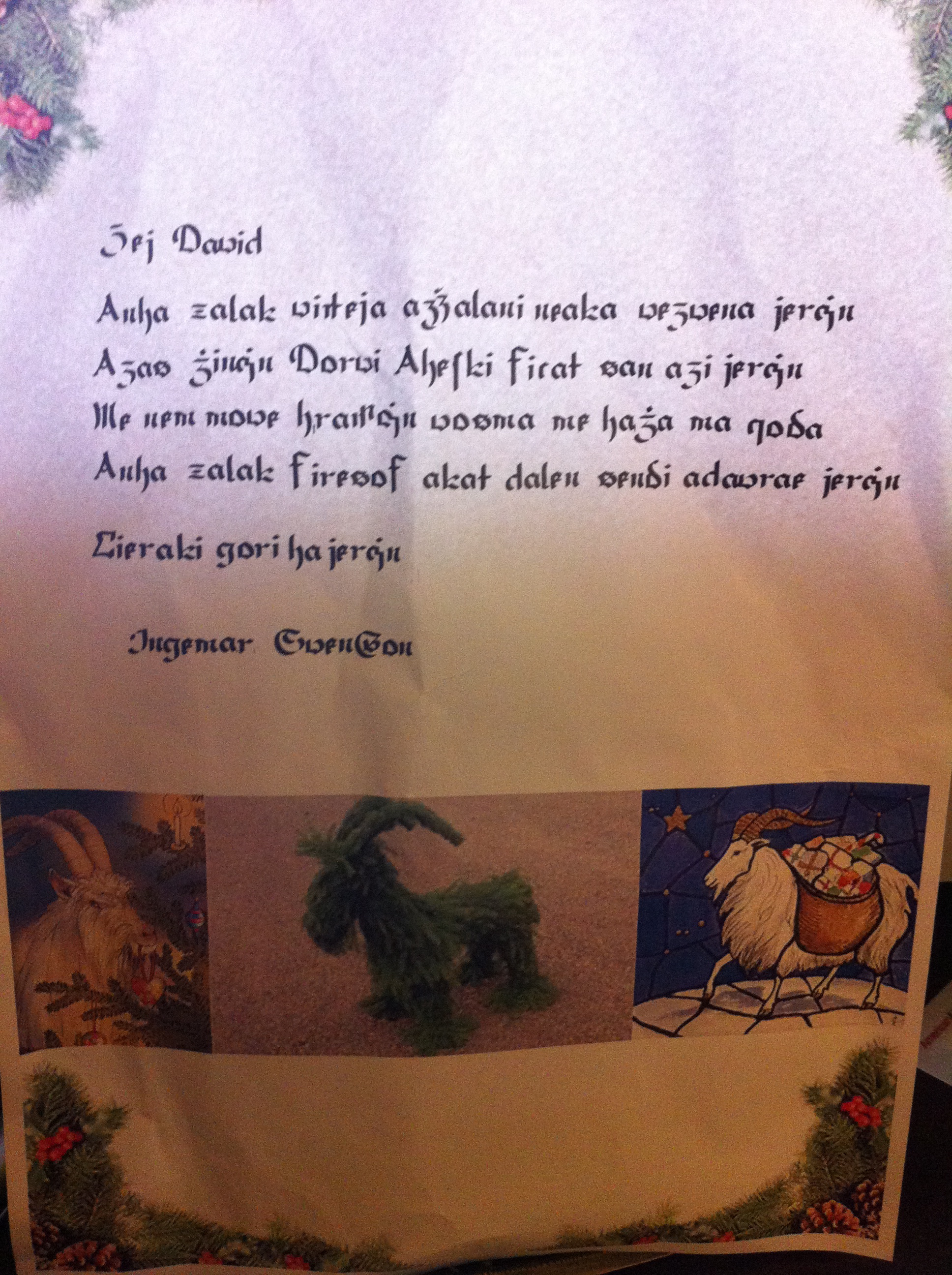And, indeed, what a merry Goatmas it has turned out to be! I realize that in my last post I had us voting on who would be crowned Winter Goat, 2012, but I had a late entry that has caused me to overturn the results of the vote (which, at the time of writing, were inconclusive anyway). Consequently, I shall push the current nominees for Winter Goat to next year, and have proclaimed this year’s Winter Goat to be the jolly fellow you see before you here!

This fine little gentleman came to me from Ingsve, who sent him all the way from Sweden! He is a traditional Scandinavian yule goat, and has a magnificent goatish beard. While yule goats are sometimes burned after they’ve served their time, I can assure you this goat (which for some reason I’ve suddenly decided to name Mr. Dorviclaus) will stay with me (unbowed, unbent, unbroken—and unburnt) for many, many years. All hail this year’s mighty Winter Goat!

Attached to Mr. Dorviclaus was this note, written by Ingsve in Qvaak’s script:

Here’s the transcription:
Zhey David,
Anha zalak vitteya ajjalani neaka vezhvena yeraan. Azhas jinaan Dorvi Aheshki fichat san azhi yeraan. Me nem move hrannoon vosma me haja ma qotha. Anha zalak firesof akat dalen senthi adavrae yeraan.
Shieraki gori ha yeraan,
Ingemar Svenson
Ingsve went with an original translation for “Christmas”: vitteya ajjalani neaka. That translates to “feast of the long night”. I rather like it!
Despite all the images, this post is rather short, as I’ve gone up to my second parents’ home for Goatmas this year. This post was actually typed up while I was packing, though I’m sure I hopped on and added a few things as I could thereafter. As a result, I didn’t have as much time to type this up. Nevertheless, I’m sure Winter Goat has something in his shaggy beard for one and all! Here he is, in fact, visiting Standing Rabbit and Sitting Turtle outside my door:

It’s been a good year, and I’m forever thankful to the few who follow this blog and come in to say M’ath! in our weekly Dothraki chats. It does get tiresome to be forever without a Dothraki word for “thank you”, though, so to remedy that (even though I begged him not to), Mr. Dorviclaus has shaken a word for “thank you” out of his frosty beard—not from Dothraki, but from High Valyrian. The word is: kirimvose (or kirimvos, for short; stress on the second i for both). Unless I miss my guess (or unless those armed with Google are very, very clever), this is the first new word of High Valyrian to be released. It will not be followed by others, as I shall return to my customary radio silence, but this being Goatmas, I simply couldn’t restrain mighty and loyal Winter Goat.
Have a Merry Goatmas, and a Goatish New Year!

I’m glad he made it in one piece.
Really excited to have a first new Valyrian word. What about the pronunciation of it? Are all the consonants and vowels pronounced like one would expect or is there any trickiness there?
In this case, you could pronounce it as if it were a Dothraki word (aside from the non-Dothraki stress pattern). That’s one of the reasons why I chose this word: It requires no further explanation.
And he did indeed make it in one piece! I love him so! Mr. Dorviclaus shall adorn my abode year-round!
Vitteyqoy davra, zhey David! Can Dothraki and High Valyrian be mixed sucessfully, from a cultural standpoint when we need a ‘thank you’?
Can Dothraki and High Valyrian be mixed sucessfully, from a cultural standpoint when we need a ‘thank you’? Also check out your previous blog entry for some new comments on the first three dorvi!
Also check out your previous blog entry for some new comments on the first three dorvi!
Kirimvose for a word in High Valyrian. Now, I can tell everyone I know the one and only word in the Valyrian dictionary
I’m glad to hear you had a great Goatmas. I had a great Goatmas (or is it Lionmas for me??) here as well, spending much of it with the cats. Wintry weather made work very difficult for all the keepers this long ‘weekend’. We also have two newborn aoudads (goatlike sheep from north Africa) who are constantly getting into trouble!
I was really hoping to have some time to do some Dotharki study this long weekend, but wasn’t so lucky
How outstanding! Do you think we could see some pictures of the aoudads? And are they goatish enough to count as goats when it comes to Winter Goat voting?
Your cats are, of course, spectacular. I’m glad to hear they had some company over the holidays.
The aoudads are much more ‘goaty’ than the sheep even though they are technically a sheep. In fact, most people who see them think they are goats. I’ll try and get a couple pictures next weekend.
Yay, High Valyrian!
So is the shortening of words common in High Valyrian? Or is kirimvose a special case because it’s a contracted phrase? ;o)
When you say it’s pronounced like Dothraki, does that mean short, close [e] and [o]?
Special case. And all the vowels are short.
And all the vowels are short.
So by saying ‘all the vowels are short, is the /o/ in Kirimvose like to /o/ in ‘boat’? Or like ‘hot’? Or something else? I’ve been playing with the pronunciation. My guess is that Valyrian has some interesting phonology.
I mean short in a phonetic sense. Certain languages have short and long vowels that serve as a contrast (Arabic, Hawaiian, Japanese, etc.). In English, what we call “long” vowels aren’t, in fact, long at all. They used to be, but English lost its length distinction. Now in English all vowels are long before voiced codas (compare the length of the “a” in “bat” to the length of the “a” in “bad”), and they’re short otherwise.
That’s reassuring. I couldn’t take any High Valyrian seriously that didn’t have contrastive vowel quantity. To me, that’s the one phonetic I relate most closely to the concept of “venerable old language”.
So are there any vowel pairs in High Valyrian where a quality contrast goes along with the quantity contrast? To my knowledge, both Ancient Greek and Latin had that for /e o/, though in opposite directions (with Latin having [ε e:] and Greek [e ε:]). Personally, I’ve always read Daenerys as [dai’nε:rys]. ;o)
For info like that, I’ll have to wait. Only a few months, though!
“Unless I miss my guess (or unless those armed with Google are very, very clever), this is the first new word of High Valyrian to be released.”
What about hāre, saelie, hāriblie etc…? ;o)
Where did you get those? xD
@ Esploranto: I don’t remember exactly, and my Google-Fu is failing me. I think it might have been a facebook post? In any case, David didn’t say which language this was for, but personally I think the orthography with macrons is a dead giveaway.
The words I quoted mean “three”, “third (a suppletive form [and I now know what that means, thankyouverymuch])”, and either “thirty” or “thirtieth” (with the other being something like hārēpse).
http://www.youtube.com/watch?v=D9eK3F32HDQ
http://www.youtube.com/watch?v=D9eK3F32HDQ
http://www.youtube.com/watch?v=D9eK3F32HDQ